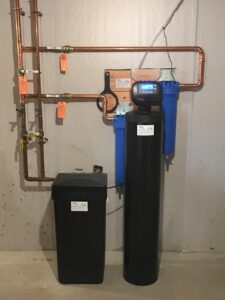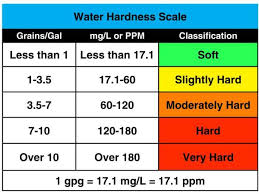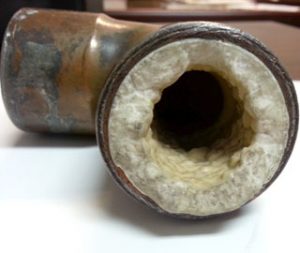Hard water contaminants found in Sudbury can be removed with a water softener. The main hard water minerals are magnesium and calcium. EPA (Environmental Protection Agency) has no maximum levels set for calcium and magnesium in drinking water. Without water softening, these minerals can eventually have significant affects on your home’s plumbing as well as your ability to clean. Hard water interferes with almost every cleaning task, including washing dishes, laundry and taking a shower. Clothes can look dingy and feel rough and scratchy, dishes and glasses get spotted and film may build up on shower doors, bathtubs, sinks and faucets. Washing your hair in hard water may leave it feeling sticky and dull. Finally, hard water can cause a scale build-up in pipes that can lower water pressure throughout the house.
Also found in Sudbury are iron & manganese.The EPA maximum allowable level for iron as a secondary contaminant is .3 parts per million. The EPA maximum allowable level for manganese as a secondary contaminant is .05 parts per million. Small amounts of these minerals can have large affects on your home’s water quality.

High Efficiency Water Softener
There are different types of water softeners, including up-flow (preferred) versus down-flow. This can make a big difference in effectiveness if there are elevated levels of manganese or iron in the water. Additionally, a high efficiency water softener will use much less salt and water in the equipment’s regeneration cycle. For a full discussion on hard water, see the link at Hard water.
The following categorizes hard water levels. Compare your test results:
OTHER AFFECTS OF HARD WATER, IRON & MANGANESE
Some affects of hard water, iron & manganese include corrosion and scaling inside pipes. Additionally, you may experience major staining throughout the home’s showers, bathtubs, and sinks and destruction of hot water heaters way ahead of their useful life. Hard water scale can build-up inside hot water heaters insulating the temperature sensor inside the tank causing them to work much harder to bring the temperature up to the set level, thus reducing the useful life and requiring early replacement. For those using their well water for outside lawn irrigation, iron and manganese can cause major staining of outside walkways, house siding and anyplace the water touches. See link at https://h2ocare.com/lawn-irrigation/.
SOURCES OF PUBLIC WATER
Per the Sudbury Annual Water Quality Reports, Sudbury’s water is obtained from nine gravel packed ground wells located in three separate aquifers; these aquifers are known as Raymond Road, Hop Brook and Great Meadow. There are four storage tanks located throughout town with a storage capacity ranging from 0.35 to 3.0 million gallons and totaling 6.35 million gallons. If your water is supplied by your own private well, much of the following information is likely to apply to your water as well.
As there are variations in the water quality among the nine sources of public water in Sudbury, treatment systems are designed to specifically address the type and amount of contaminants present at each site. Following treatment, water is pumped to elevated storage tanks for distribution to your home. When tanks are full, the pumps at the wells shut off and water is fed to customers from the tanks. As soon as demand brings tank levels to the “start” level, the pumps restart and the cycle begins again. In order to perform scheduled and emergency maintenance operations, the specific wells selected to be in service at any time will vary. Therefore the water delivered to your home does not necessarily originate at a single point but rather is a blend of a number of wells.
Due to this switching among the nine wells, you may see variations in the water quality in your home at different points in time. You may see some evidence of hard water scale on plumbing fixtures, iron/manganese staining or bluish green stains (from low pH) in sinks, tubs, etc. All of these are correctable situations with the properly designed water filtration system or water softener installation. Due to the changing water quality as described above from various water sources, it is particularly important that any water filtration or water softener system is designed with this in mind.





